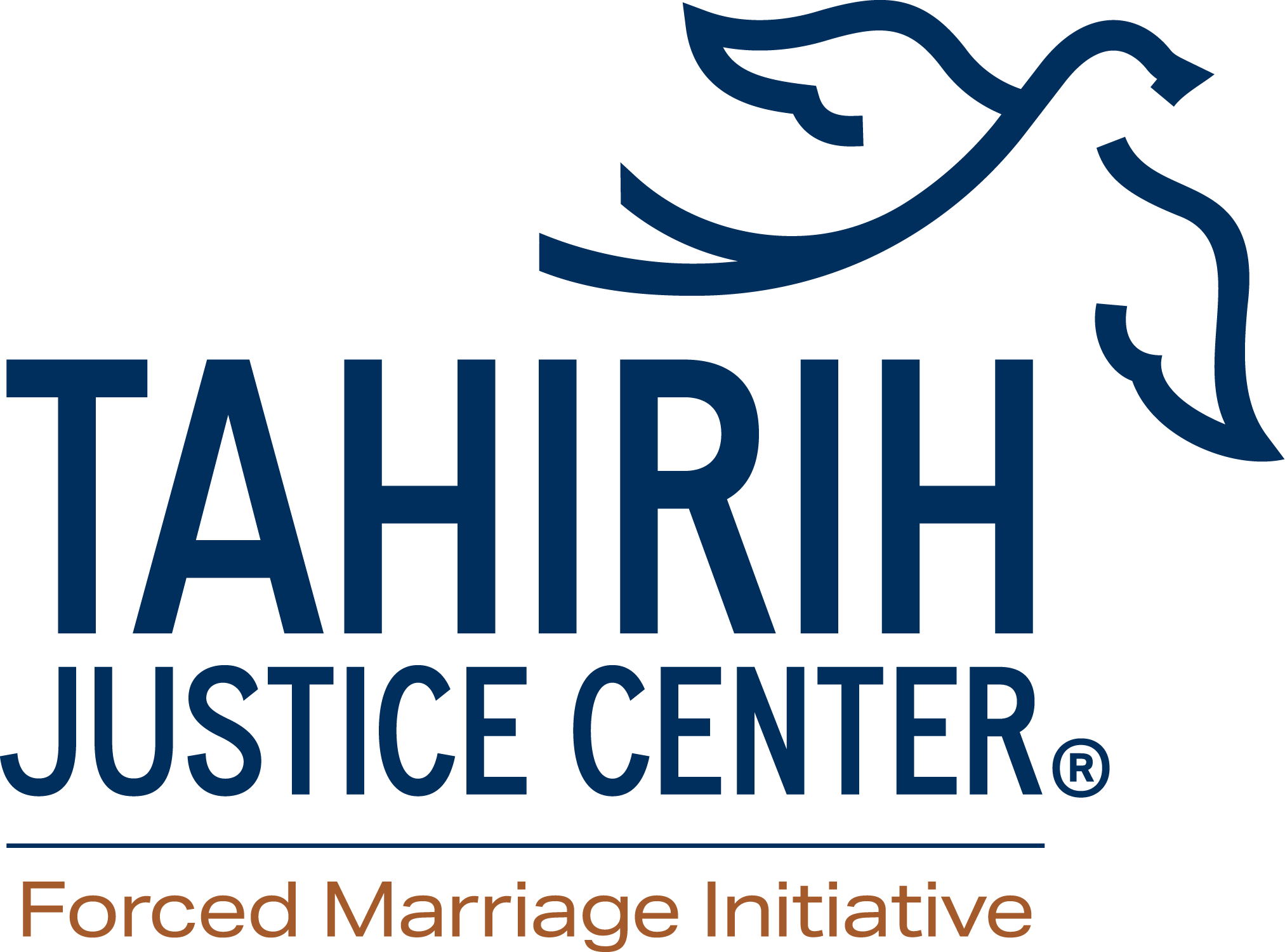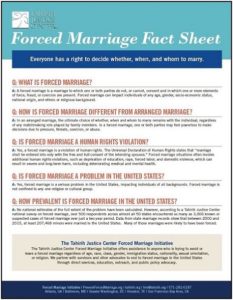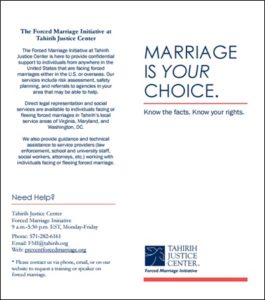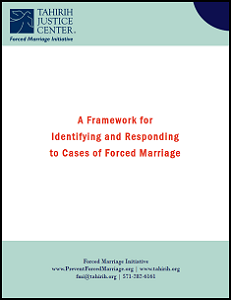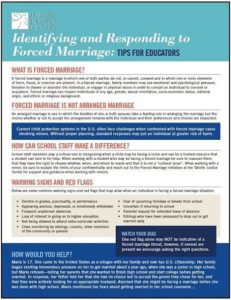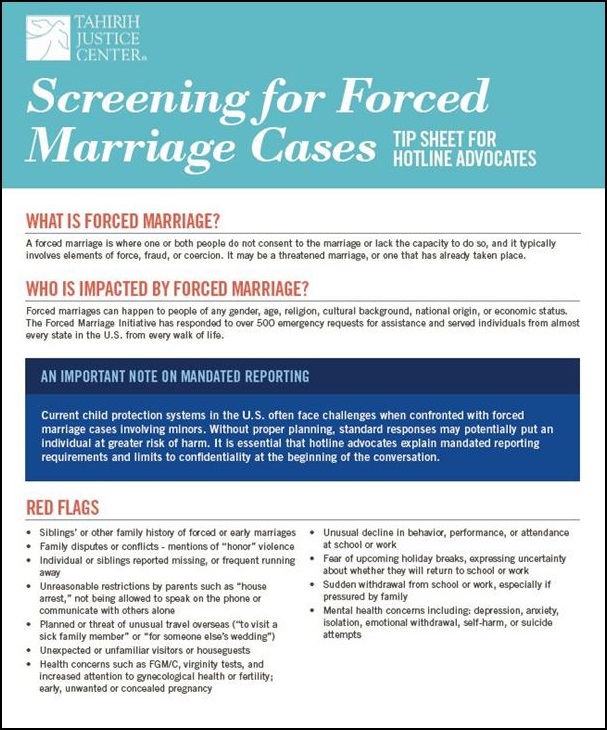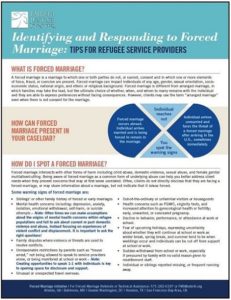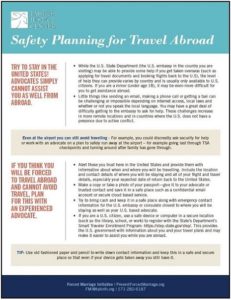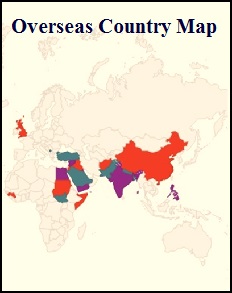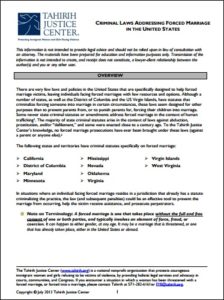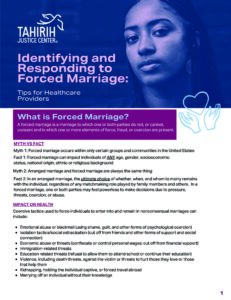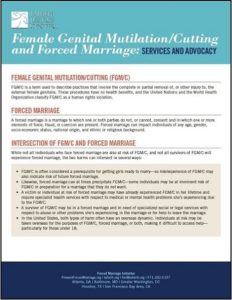Resource Toolkit
Our Training and Resource Toolkit is intended to provide a basic foundation for professionals seeking to understand the unique dynamics of and challenges posed by forced marriage cases and better identify, screen and respond to individuals at risk.
This is a good starting point for teachers, counselors, domestic violence and sexual assault service providers, hotline and shelter staff, youth advocates, legal and law-enforcement professionals and other individuals interested in learning more about forced marriage and how to provide an appropriate response for survivors. For more information on providing services to people facing forced marriage, see our Framework for Identifying and Responding to Cases of Forced Marriage.
This webinar training is presented by experts from the Forced Marriage Initiative at the Tahirih Justice Center. The webinar presents an overview of the nature of forced marriage, the connection between forced marriage and other forms of abuse, such as domestic violence and child abuse, and the unique challenges of providing support and safety-planning in these cases. Take notes as you follow along! Click here to download handouts of the slides.
Use our Forced Marriage Fact Sheet to share information with your colleagues.
The Forced Marriage Fact Sheet provides basic information and answers to frequently asked questions about forced marriage in the United States. Download here.
Equip individuals with information about their rights and how to stay safe using our “Marriage is Your Choice” Brochure.
The “Marriage is Your Choice” Brochure provides accessible information including definitions and warning signs of forced marriage, legal rights of minors and adults, safety tips, and support resources. Download in English, Arabic, Spanish, French, Dari, or Pashtu.
Equip yourself as a service provider to identify and assist individuals facing forced marriage with our Framework for Identifying and Responding to Cases of Forced Marriage.
This framework provides comprehensive guidance for service providers who may encounter individuals facing forced marriage. It includes an overview of the complex nature of forced marriage cases, tips for screening and conducting a needs assessment, sample intake forms, and appendices offering more specific guidance on safety planning for relocation, travel abroad, family mapping, working with minors, and the intersection of forced marriage with female genital mutilation/cutting. Download here.
Learn about the key role educators can play in supporting individuals at risk and how you can help with our Tip Sheet for Educators.
Teachers, school counselors, and other education professionals are often first responders in forced marriage cases. This resource provides information about warning signs and best practice tips for educators working with students who disclose forced marriage concerns. Download here.
Learn how to effectively and responsible screen for forced marriage with our Tip Sheet for Hotline Advocates.
Forced marriage often intersects with other forms of violence, making hotline advocates invaluable first responders in forced marriage cases. This resource provides information about warning signs and best practice tips for hotline advocates to screen for cases of forced marriage in their existing workload. Download here.
Learn about the key role refugee service providers can play in supporting individuals at risk and how you can help with our Tip Sheet for Refugee Service Providers.
Forced marriage intersects with many other forms of harm, including child abuse, domestic violence, sexual abuse, and female genital mutilation/cutting. Being aware of forced marriage as a common form of underlying abuse can help refugee service providers to better address client needs that, when initially presented, may seem unrelated. This resource provides information about warning signs and best practice tips for service providers working with refugee clients who disclose forced marriage concerns. Download here.
Plan for staying safe and getting help when leaving the United States with our Safety Planning for Travel Overseas Tip-Sheet.
Individuals who are at risk of forced marriage are strongly advised to avoid overseas travel, as it can be extremely difficult to get help outside of the U.S. This resource is for advocates working with those at risk of forced marriage to avoid unwanted travel or to stay safe while overseas. Download here.
Use our Interactive Country Map to learn more about the barriers and challenges faced when forced marriage is threatened or happens overseas.
It can be very difficult to access help, escape, or return to the United States once overseas, especially if identity documents like passports are confiscated. Local law enforcement may be unwilling or unable to intervene in forced marriage situations, and there may be few resources in-country that are able to help. Click here to learn more about the laws and limitations in specific countries.
Does your state have a forced marriage criminal law? Find out from our review of Criminal Laws Addressing Forced Marriage in the United States.
This resource provides a detailed overview of existing state based criminal laws against forced marriage in the U.S. Download here.
Learn about the key role Healthcare Providers play in identifying and responding to forced marriage cases with our Tip Sheet for Healthcare Providers
This tip sheet provides an overview of forced marriage in the healthcare setting and provides guidance for healthcare providers who may encounter individuals facing a forced marriage. It includes dispelling common myths, a overview of the health impacts survivors may experience, common red flags, and tips on how to screen for and respond to suspected cases of forced marriage. Download here.
Read our fact sheet to find out how forced marriage can intersect with female genital mutilation/cutting.
While not all individuals who face forced marriage are also at risk of FGM/C, and not all survivors of FGM/C will experience forced marriage, the two harms can intersect in several ways. Find out about support available for those facing FGM/C and forced marriage. Download here.
Learn more! Our resource library is full of free online trainings and publications. You can also Request a Training from our experts that is tailored to meet the needs of your staff.
